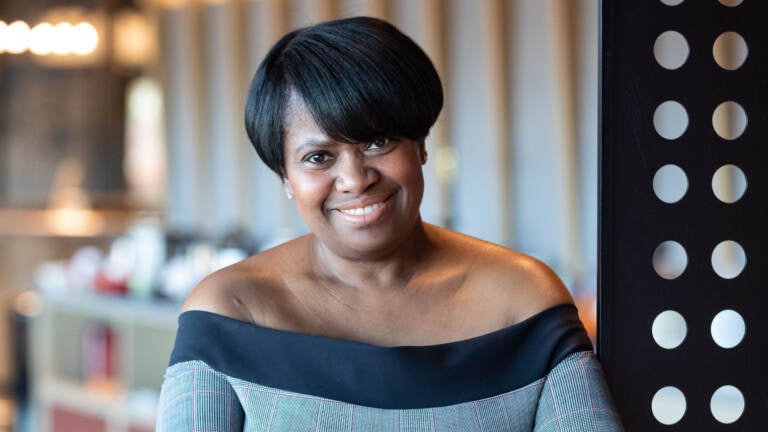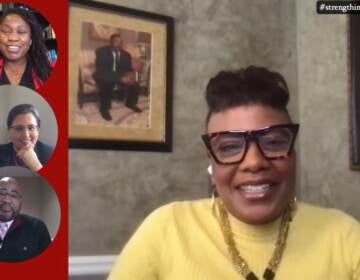For Women’s History Month, tech trailblazer April Walker offers wisdom based on experience
Microsoft executive Walker, who grew up in Philly, has advice for young Black women entering the workforce, and the companies that want to retain them.

April Walker, from Southwest Philadelphia, is the General Manager of the United States Microsoft Technology Centers. (Courtesy of April Walker)
April Walker, general manager of the U.S. Microsoft Technology Centers, starts her day at 4:30 a.m., in silence. In the early morning quiet of her suburban Philadelphia home, she meditates for about 20 minutes, or reads, or just sits, before leading Microsoft innovative teams across the nation.
“The quiet to me is an energy source for creativity,” said Walker. “Because you’re clearing your mind, you’re allowing your mind to focus on anything it wants to.”
That time fuels her for the day, she said, and gives her more patience and calm.
To mark Women’s History Month, WHYY News spoke with Walker about her pioneering trajectory through the tech industry, a world historically dominated by white men.
Born in Southwest Philadelphia, Walker attended Harrity Elementary School and the Philadelphia High School for Girls. She went to Howard University, a historically Black university, and later earned her MBA at Massachusetts Institute of Technology.
Her first job in IT was one she created for herself. At a nonprofit she worked for as an undergraduate student, she saw some computers sitting, turned off, unused. So she made a bet with her manager.
“I said, `Well, tell you what, if I figure out what to do with them, can we make that my job?’ And she said, `Sure,’” said Walker. “So I ended up staying there overnight, installing these huge IBM computers.” Then she taught the office how to use them.
Walker said she was influenced by her mother, who would tell her, “I want my children to be the knowers in the room, and not just the doers.”
After that nonprofit job, Walker worked for the U.S. Department of Justice and Department of Energy as an engineer. In her early 20s, she traveled the country and the globe, designing and building networks and training U.S. Marshals.
Following leadership roles at some major tech companies, she was recruited by Microsoft and moved back near her home city four years ago.
Walker is a trailblazer not just in the tech world, but the corporate world overall. According to Mercer, the human resources consulting company, as of 2020, African American employees held 12% of support staff roles nationally, but only 2% of executive-level positions.
And a 2020 report by Lean In, the women’s workplace advocacy organization, says only 1.4% of Black women hold C-suite positions, and only 1.6% are in vice president roles. The report was based on Lean In and McKinsey & Co.’s annual Women in the Workplace study; it calls itself “the largest study on the state of women in corporate America, and the largest study on the experiences of women of color at work.”
At Microsoft, Black employees made up 4.5% of the workforce as of 2020, which falls in line with most other major tech companies. In 2015, 88% of upper-level employees were male at Microsoft.
After the protests that followed the killing of George Floyd by police in Minneapolis, Microsoft said it was committed to focusing on the hiring and retention of Black employees.
Walker said there is still a lot of work to be done in the industry. Even with her experience, she said, she still faces obstacles that her white counterparts do not.
Some of those relate to stereotypes against Black women, said Walker.
“You’re not able or given grace to have emotion or to candidly be angry when there needs to be a time to be angry about something,” she said. “Or just the questioning of why or how you got there, despite a rich experience of very notable, wonderfully impressive, credible credentials.”
That kind of stereotyping, along with harassment and unfairness experienced by people of color and women in the tech industry, leads to high turnover rates, as reported by the Kapor Center in 2017.
Early in her career, Walker said, she felt she wasn’t given the same amount of respect as her white male or female counterparts.
“The rewards that they were getting were so different from what I was experiencing,” she said, and sometimes credit would be given to someone else for her work.
She said she has also been looked over for opportunities because she wasn’t part of the “club.”
“And being a part of the club requires that someone has to be in the club that either looks like you or wants you there to add the diversity of thought,” Walker said.
It’s an uphill battle to C-suite positions, said Walker, “and it is because of the lack of that presence, we are less able to bring others along with us.”
As someone with a seat at the table now, one of very few seats, she offered advice to young Black women entering the workforce: Find a mentor and a sponsor.
She defined a sponsor as someone who has an executive seat who will advocate for you. If there isn’t anyone in that room who looks like you, said Walker, that’s where allies come in.
“Ally, to me, is a verb … You really have to have someone in the proverbial room that’s willing to say, `Hey, let’s bring this group in.’”
Another piece of advice: Be your own best advocate. That comes with knowing your worth, said Walker, which can’t be defined by your title or salary, “it has to first come with you.”
“Know your own value. Come with the authentic you,” she said.
Lastly, “[make] sure that you don’t allow fear, fear of failure, fear of taking risks, fear of not being seen the way that you want to be seen, stop you from going after that next job, or going after the promotion that you want, or going after the need to ask for more money,” Walker said.
But she pointed to company executives, too. It is the organization’s responsibility, Walker said, to create an environment that embraces authenticity and allows employees to fail without fear of punitive repercussions, and that makes room for growth.
She said leaders need to be responsive to their employees, ensuring that they are heard and valued.
“You can’t be a leader if you turn around and look behind you and there’s no one there. Right? You’re not a leader,” said Walker.
Tangible ways employers can create more inclusive spaces? Recruit from historically Black universities, and do the work required to retain people of color.
For HBCUs, said Walker, it’s more than recruitment. “It’s investment in curriculum, it’s investment in the students, it’s investment in helping to ensure that once the students complete their STEM programs at these universities that they have opportunity.”
Retaining talent is “a business imperative,” said Walker. “You can’t achieve retaining talent by making any of your workforce feel as though they’re not worthy, they’re not a valued contributor to the bottom line and success of any organization … What you want to do is retain those that are loyal to your mission, loyal to your company, and have institutional knowledge.”
She wants to see more Black women in C-suite positions, the kinds of top corporate roles that set the stage for how a company builds its ecosystems.
And she also offered tips for women, and specifically Black women, to help avoid burnout.
What works for her, Walker said, is allowing herself grace when she makes mistakes.
“It’s freeing, having an expectation that you’re not going to succeed at everything.”
Along with that, Walker said, she laughs at situations, and herself.
“Everything doesn’t always have to be so serious,” she said. “Instead of being hard on yourself, instead think of what you learned from it, think of what was funny about it.”
When the business day is done, Walker said, she leaves her work behind her and tries to relax. You have to “make yourself a priority,” she said, which is particularly hard for Black women, who often fill the role of caregiver for those around them.
Her resiliency is her superpower, but it’s fed by prioritizing her mental and physical health.
“So that I can show up as the best April that I can be, the best leader that I can be.”
—
On Friday, April 29, April Walker will speak at the Women’s Resource Center’s “Breakthrough Breakfast.” Proceeds will go to the center, a nonprofit serving women and girls facing life transitions across the five-county Southeastern Pennsylvania region. WRC services include an Information & Referral Helpline (701-314-4357), counseling, low-cost family law assistance, a Girls Lead program, and a new financial stability program.

Saturdays just got more interesting.
WHYY is your source for fact-based, in-depth journalism and information. As a nonprofit organization, we rely on financial support from readers like you. Please give today.







